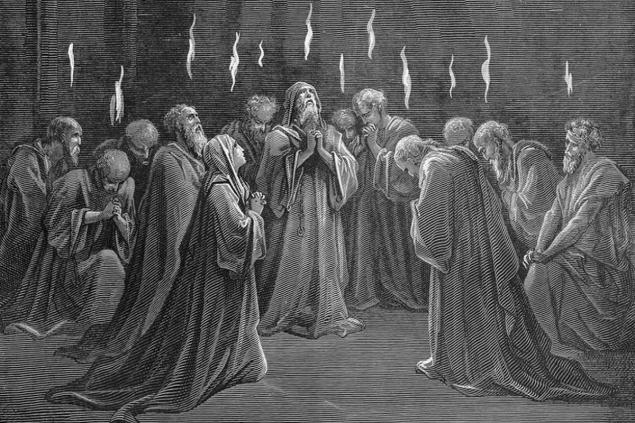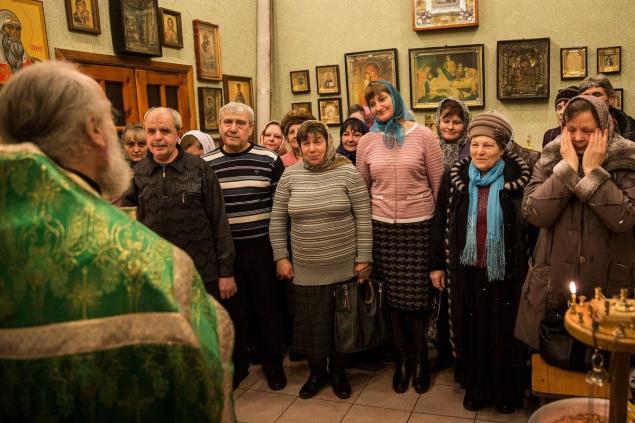133
Fasting is profitable, food fasting takes about a third less than on ordinary days.
Church dogmas, instructions and instructions to ordinary laity, that is, you and I, sometimes seem very difficult, even impossible. And the point here is not even that they are difficult to perform, but in the misunderstanding of the most basic, basic things. For example, here's what. leaning? Are there any exact differences from food?

If you look into the past, follow, so to speak, the historical path, we will come to the writing of the book “Tipicon”. Its text was written and finally formed in the 17th century by the Russian Church. In essence, it is a set of rules relating to everyday life. What to do, what to do in your free time and so on. But there is one "small" detail.
In fact, “Tipicon” is nothing more than a monastic rule. It describes in detail how to treat brothers. Where to get clothes. Who has the advantage of this or that property in the cells and the like. In short, a set of rules for monk. Nevertheless, in Russia, this book is practically a handbook, telling how to live for all Orthodox believers.

However, not everyone agrees with this dogma. For example, Archimandrite Savva Mazhuko says the following: in fact, throughout the history of the Russian Church there were many different strong monasteries. Each of them has its own statute. They were not rarely very different from each other. Is there an officially recognized canon? Actually, no.
Moreover, a clear understanding of what is leanWe don't either. The fact is that the very tradition of fasting was formed long ago in the East. In places with a different climate and, accordingly, not too native products and rhythm of life. So does that mean you can spit on everything and stop fasting altogether?

It's actually a lot easier. "Tipicon" is a very strong book, that's a fact. But it should be treated rather as a general set of rules. Especially lay people. However, now few people need information about the life of monks of the 17th century, especially about the correctness of their diet. You need to act locally: ask for advice from the local church abbot. He will tell you what to do and what to fast specifically for you.
But for himself, Archimandrite advises to use the method of "two c". I mean, rely on modesty and restraint. That's the essence of fasting. It is not permissible for an Orthodox person to eat fish and meat while fasting. The motivation for fasting is not vegetarianism. The core is to limit oneself from excessive pleasures, especially gluttony.

Here it is important to understand that God does not want to take away from believers even a drop of their health. Modern medicine has come a long way. Therefore, small children, sick or pregnant is not necessary to fast. Just like travelers. Moreover, if the stomach does not perceive any specific products, during fasting, you also definitely do not need to switch to them.
For example, milk is not considered a lean product. But if a layman without taking this product can begin problems with the gastrointestinal tract, milk can and should be consumed even in fasting. With porridge, for example, or just like that. But this does not mean that you can weave sweet cheeses or parmesan yourself to crumble: these are dairy, like, products. Of course, such a substitution is, first of all, self-deception.
In other words, if lean food is more expensive than fast food, this is no longer fasting. But the amount of this food is also important. Eat buckwheat with mushrooms, eat lean pancakes and add to this case candies with halva and honey. And then lying all day on the couch, trying to digest it all. What post is this? The most natural is overeating.

But based on modesty and restraint, everything falls into place. Naturally, there are a number of products for fasting that can be consumed. There are entire lists and they are quite logical. With portions is not so simple, so the same church advises to do as they say about restaurants: you need to get up from the table with a feeling of light hunger, not oversaturation. And you'll be fine.
If you sum up some results, you can find out the following for yourself. Many lay people do not fast just because they do not understand why they should deny themselves the pleasure of eating until after work. This is not very good, at least from the side of proper nutrition. But it is absolutely impossible to condemn such people - it is their personal choice.
But there are still some people who do not want to fast according to their inner state. The rejection of certain products, personal tastes. Well, honey doesn't fit him, for example. And sweet oh, I like it. Well, drink that tea with sugar, but not in 3 spoons, and add one. You can even have half. And the tea is sweet and you've done a good job.

In any case, everyone decides whether to fast or not for himself. It has to be a conscious choice. People need to review their life principles and habits at least several times a year. And in order not to drown in worldly pleasures or gluttony, fasting is a great practice that allows you to restrain yourself. But even in this case, the measure must be observed.
Photo at preview and in article

If you look into the past, follow, so to speak, the historical path, we will come to the writing of the book “Tipicon”. Its text was written and finally formed in the 17th century by the Russian Church. In essence, it is a set of rules relating to everyday life. What to do, what to do in your free time and so on. But there is one "small" detail.
In fact, “Tipicon” is nothing more than a monastic rule. It describes in detail how to treat brothers. Where to get clothes. Who has the advantage of this or that property in the cells and the like. In short, a set of rules for monk. Nevertheless, in Russia, this book is practically a handbook, telling how to live for all Orthodox believers.

However, not everyone agrees with this dogma. For example, Archimandrite Savva Mazhuko says the following: in fact, throughout the history of the Russian Church there were many different strong monasteries. Each of them has its own statute. They were not rarely very different from each other. Is there an officially recognized canon? Actually, no.
Moreover, a clear understanding of what is leanWe don't either. The fact is that the very tradition of fasting was formed long ago in the East. In places with a different climate and, accordingly, not too native products and rhythm of life. So does that mean you can spit on everything and stop fasting altogether?

It's actually a lot easier. "Tipicon" is a very strong book, that's a fact. But it should be treated rather as a general set of rules. Especially lay people. However, now few people need information about the life of monks of the 17th century, especially about the correctness of their diet. You need to act locally: ask for advice from the local church abbot. He will tell you what to do and what to fast specifically for you.
But for himself, Archimandrite advises to use the method of "two c". I mean, rely on modesty and restraint. That's the essence of fasting. It is not permissible for an Orthodox person to eat fish and meat while fasting. The motivation for fasting is not vegetarianism. The core is to limit oneself from excessive pleasures, especially gluttony.

Here it is important to understand that God does not want to take away from believers even a drop of their health. Modern medicine has come a long way. Therefore, small children, sick or pregnant is not necessary to fast. Just like travelers. Moreover, if the stomach does not perceive any specific products, during fasting, you also definitely do not need to switch to them.
For example, milk is not considered a lean product. But if a layman without taking this product can begin problems with the gastrointestinal tract, milk can and should be consumed even in fasting. With porridge, for example, or just like that. But this does not mean that you can weave sweet cheeses or parmesan yourself to crumble: these are dairy, like, products. Of course, such a substitution is, first of all, self-deception.
In other words, if lean food is more expensive than fast food, this is no longer fasting. But the amount of this food is also important. Eat buckwheat with mushrooms, eat lean pancakes and add to this case candies with halva and honey. And then lying all day on the couch, trying to digest it all. What post is this? The most natural is overeating.

But based on modesty and restraint, everything falls into place. Naturally, there are a number of products for fasting that can be consumed. There are entire lists and they are quite logical. With portions is not so simple, so the same church advises to do as they say about restaurants: you need to get up from the table with a feeling of light hunger, not oversaturation. And you'll be fine.
If you sum up some results, you can find out the following for yourself. Many lay people do not fast just because they do not understand why they should deny themselves the pleasure of eating until after work. This is not very good, at least from the side of proper nutrition. But it is absolutely impossible to condemn such people - it is their personal choice.
But there are still some people who do not want to fast according to their inner state. The rejection of certain products, personal tastes. Well, honey doesn't fit him, for example. And sweet oh, I like it. Well, drink that tea with sugar, but not in 3 spoons, and add one. You can even have half. And the tea is sweet and you've done a good job.

In any case, everyone decides whether to fast or not for himself. It has to be a conscious choice. People need to review their life principles and habits at least several times a year. And in order not to drown in worldly pleasures or gluttony, fasting is a great practice that allows you to restrain yourself. But even in this case, the measure must be observed.
Photo at preview and in article
My parents told my husband to urgently take me on vacation, already in the fourth year of marriage, and never rested anywhere.
Going to pamper my mother-in-law, carrying a jar of condensed condensed and lemon to surprise my second mother.























